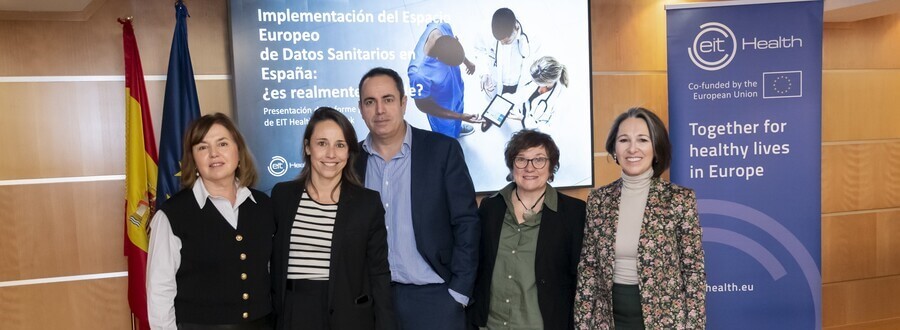
Spain is positioned to lead the implementation of European Health Data Space
Spain is in a privileged position to lead the implementation of the European Health Data Space (EHDS) across Europe. This is one of the main conclusions of a report by EIT Health Spain, the Spanish hub of EIT Health, based in the Barcelona Science Park. The document was presented today at the European Parliament Office in Madrid, in an event in which those responsible for its preparation revealed both the opportunities and the challenges and difficulties to be overcome for the proper application of the EHDS, which the European Commission expects to come into operation in 2025.
According to the report titled “Implementation of the European Health Data Space in Spain: Is it really feasible?”, Spain possesses advantages that position it favorably to lead innovation in the health sector, specifically in the field of secondary data use. “Spain ranks among the top five European countries in data digitisation and is also a global leader in clinical research. It has various public-level strategies and programmes, along with funding, to advance the digital transformation of the healthcare system,” summarised Izabel Alfany, managing director of EIT Health Spain.
However, the implementation faces numerous challenges in a short period, such as developing agile regulations, defining strategic resource allocation, distributing functions and responsibilities for governance, creating efficient technical solutions, normalising and consolidating data for interoperability, and ensuring data protection. Both patients and healthcare professionals can be the driving forces of this change, unleashing the power of health data to help develop safer and more effective treatments and health solutions and design more sustainable and patient-centred public health services.
This will require profound cultural changes in healthcare and throughout Spanish society, moving from privacy-focused approaches to a sharing of health data for the public interest, along with legal, ethical, and security considerations. Spain can implement the EHDS shortly, but “to ensure successful implementation, collaboration and commitment from all stakeholders, both in the public and private sectors, as well as resource allocation in infrastructure and training, are required,” added Alfany.
The EHDS is seen as a significant opportunity for Spain to advance in innovation and digital health, moving towards value-based care for patients, as highlighted in the report. This report is part of a pan-European initiative by the EIT Health Think Tank that evaluated the feasibility of implementing the EHDS legislation in all EU countries. The initiative, coordinated by a committee chaired by Dr Andrzej Rys, principal scientific advisor of the DG Sante of the European Commission, was carried out through 10 expert panels in data, leaders in health innovation, and political and public representatives from all countries. The final report will be presented in the first half of 2024.
Is Spain ready to address EHDS?
The presentation of the report at the European Parliament Office in Spain, in addition to analyzing its main conclusions, concluded with a debate in which some of those responsible for its preparation participated, where both the opportunities, challenges and difficulties to overcome in our country for the proper implementation of the EEDS.
This report addresses Spain’s readiness in six dimensions of implementing the new regulation: EHDS governance, data quality, funding and resources, technical and human capabilities, connection between primary and secondary data use, and communication and awareness. The document also provides recommendations for successful implementation.
In a context where physical infrastructure for data storage and processing is already available in all autonomous communities, the experts emphasise the need to focus on more complex tasks. This includes developing solutions that enable data owners and users to interact efficiently or transform decades-old legacy electronic records and fragmented health information systems into data compilations suitable for secondary use (research, innovation, policy formulation, and regulation).

Participants in the presentation of the report: Ángeles Barrios, Izabel Alfany, Joaquín Cayón, Montserrat Daban and Ana Miquel. Photo / EIT Health Spain.
The experts also highlights the need to invest in the technical and human capabilities and competencies necessary for undertaking this transformation and acknowledges that it will take time to achieve changes that facilitate, rather than hinder, data management compatible with healthcare professionals’ work and patient care continuity.
Although the challenges are significant, the overall sentiment among the experts participating in the report is optimistic.
» Link to the full news story: EIT Health Spain website [+]




